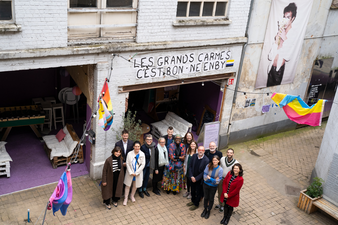
At the end of March we were honoured to welcome Winnie Byanyima, UNAIDS executive director to Brussels. The executive director made time to speak to both civil society organisations and the Parliamentarians for the 2030 Agenda.
In conversation with brussels civil society
In ‘Les Grands Carmes’, the new multidisciplinary LGBT+ centre in the heart of Brussels, she met several local NGOs. One of these organisations is Ex Aequo, an organisation dedicated to fighting HIV in men who have sex with men. They shared their plans with Mrs Byanyima to transform the historical building of ‘Les Grands Carmes’ into an LGBT+ centre where people can get tested for HIV and receive mental and social care. They’re working on this project with the city of Brussels and several other organisations focused on different aspects of LGBT+ wellbeing.
Ex Aequo was accompanied by Oxfam, IPPF, Sensoa and DSW for an interesting talk about the future of HIV-testing, sexual and reproductive health, and rights (SRHR) and the global backlash against human rights. An HIV-diagnosis still harbours a lot of stigma. Even in Belgium we notice that people still have to go through a difficult period of coming-out. More inclusive spaces, where people with HIV are helped by caregivers and volunteers that understand their struggle, can help in prompting change.
Visit to parliament
After her exchange with the civil society organisations she continued her visit in parliament where she was welcomed by Sensoa and the Parliamentarians for the 2030 Agenda. In their talk, the members of parliament and the executive director, touched on many issues in the approach of HIV care, partly thanks to the many questions of the active participants.
Some highlights of the talk:
The fact that HIV is inherently linked to human rights ran like a thread through Winnie’s answers. We have to always keep this in mind when writing legislation. Or to quote the executive director:
- There was an emphasis on the importance of education. Girls who finish their secondary education halve their chances of contracting HIV during their lifetime.
- The efficiency and accessibility of HIV care is tightly connected to the legal framework of the country in question. That is why the parliamentarians, and the executive director also voiced their concern about the rise of nationalism and the anti-rights movement in Belgium and the world.
- Another question that was raised was how we can provide quality information in a world with so much fake news.
The fact that HIV is inherently linked to human rights ran like a thread through Winnie’s answers. We have to always keep this in mind when writing legislation. Or to quote the executive director:
“We have everything we need to prevent HIV infections. The reason people still die of HIV is because of inequalities. Inequalities related to race, gender, sexual identity and class. HIV is not just a disease, it’s also about human rights!”
-Winnie Byanyima
-Winnie Byanyima

 RSS Feed
RSS Feed